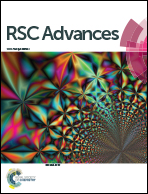An integrated metabonomics and microbiology analysis of host-microbiota metabolic interactions in rats with Coptis chinensis-induced diarrhea†
Abstract
Coptis chinensis Franch., a bererine-containing traditional Chinese medicine (TCM), is often used to treat intestinal infections, diabetes and hyperlipidaemia, and often causes diarrhea. To clarify the potential mechanism of toxicity that induces diarrhea, Sprague-Dawley (SD) rats were treated with Coptis chinensis dosage of 5 g kg−1 for 14 consecutive days. PCR-denaturing gradient gel electrophoresis (PCR-DGGE) was used to monitor the dynamic changes in the gut microbiota, while 1H NMR profiles were applied to reveal the metabolism of host and microflora. In the Coptis chinensis-treated group, decreased short chain fatty acids (SCFAs) and branched chain fatty acids (BCFAs) and increased branched chain amino acids (BCAAs) levels were detected in faeces, whereas increased BCFAs were present in the urine. This finding implied that Coptis chinensis triggered malabsorption and suppressed bacterial fermentation as well as protein degradation. Meanwhile, decreased levels of Bacteroides and Prevotella and elevated levels of Enterobacter and Veillonella in the treatment group were significantly correlated to the urinary and faecal metabolites. Using metabolite-set enrichment analysis (MSEA) and the correlation analysis between significant bacteria and metabolites, the results demonstrated that Coptis chinensis intervention suppressed glycine and serine metabolism which affected the growth of intestinal bacteria. Moreover, the perturbed microbiome consequently influenced the homeostasis of monosaccharides, amino acids, and choline, and energy metabolism of gut microbiota and host. These findings help to elucidate Coptis chinensis intervention and toxicity; simultaneously, this integrated strategy may provide an effective method for the systematic assessment of host responses to TCM or any other botanical-based nutraceuticals.


 Please wait while we load your content...
Please wait while we load your content...